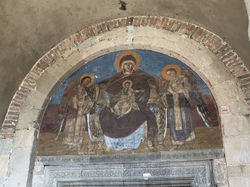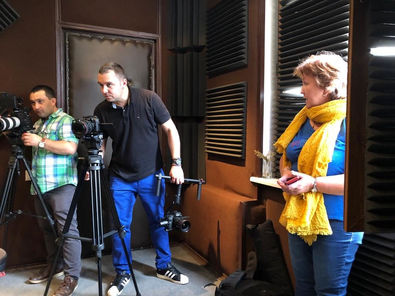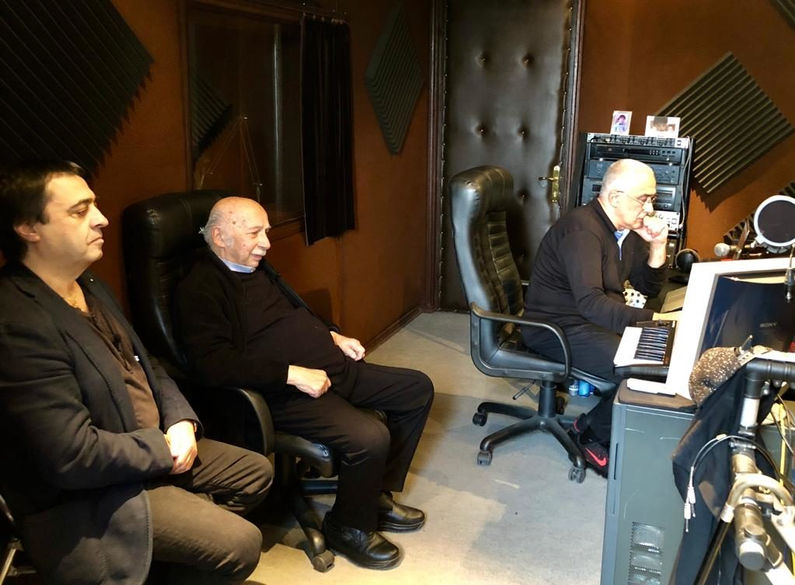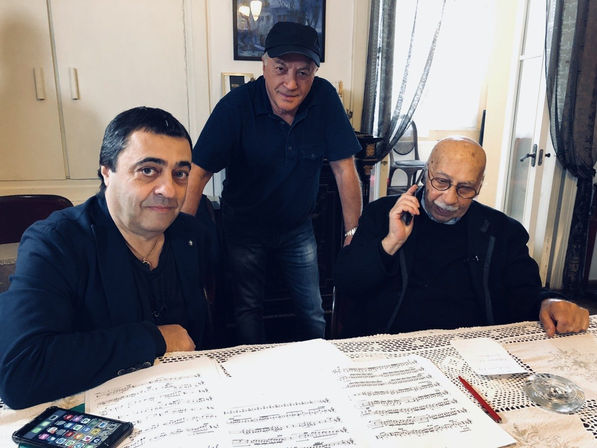
1h 21min | Georgian | Russian | English | Director Olga ANTIMONY
Giya Kancheli:
I used to hate Clarinet
Synopsis
A film about a famous Georgian composer Giya Kancheli, the author of symphonic and chamber music, known to millions of people in the former USSR for his music for the films “Mimino”, “Tears Dropped”, “Kin-dza-dza”, “Passport”, “Don’t Cry”.
He’s believed to be the greatest composer of our time, along with such giants as Nino Rota, Henry Mancini, or Michel Legrand. Canadian clarinetist, Julian Milkis, as a child, left the Soviet Union and emigrated to Canada. During that time, he had never seen any movies with soundtracks written by Giya Kancheli. One day, while driving to perform at his own concert, he turned on the car radio and heard Kancheli's music for the first time. He was so mesmerized by the power of the music, that he almost missed his own performance! Kancheli and Milkis ended up meeting ten years later. Julian invited Giya to his concert, but Giya replied,
"Тhanks, you are a nice young man, but I hate clarinet."

“I would be happy if the future
generations regarded my works –
if they won’t be forgotten, of course – as an attempt to leap out of the dark into the light.”
Giya Kancheli
Behind the Scenes
Directors Bonus Features
Giya Kancheli Biography

Music, like life itself, is inconceivable without romanticism.
Romanticism is a high dream of the past, present, and future–a force of invincible beauty
which towers above, and conquers, the forces of ignorance, bigotry, violence, and evil.
Giya Kancheli
Giya Kancheli was a prominent Georgian composer, born on August 10, 1935, in Tbilisi, Georgia. He was widely recognized for his deeply emotional and minimalist approach to composition, which has resonated with audiences around the world.
Kancheli’s musical journey began at the Tbilisi State Conservatoire, where he studied under Iona Tuskiya. After graduating, he worked extensively as a composer for stage and film, contributing scores to over 100 films. His music for cinema is particularly noted for its poetic and reflective qualities.
Throughout his career, Kancheli composed a significant number of symphonic works, including seven symphonies and a liturgy for viola and orchestra, "Mourned by the Wind." His compositions often reflect a deep sense of melancholy and longing, a reflection of the geopolitical struggles of his homeland.
Kancheli's style is characterized by its use of silence and sparse, but poignant, musical phrases. His works are often seen as protests against the brutality and violence of the modern world, making him a vital voice in contemporary classical music.
After the collapse of the Soviet Union, Kancheli lived in Western Europe where he continued to compose, receiving numerous international awards and honors. His works have been performed by major orchestras worldwide, including the New York Philharmonic and the Berlin Philharmonic.
Giya Kancheli passed away on October 2, 2019, leaving behind a legacy that continues to influence and inspire the music world. His music, marked by its emotional depth and minimalistic style, remains a profound commentary on the human condition.
Selected Works
https://en.wikipedia.org/wiki/Giya_Kancheli
Stage:
-
Music for the living, opera in two acts (1982–1984)
Orchestral
-
Symphonies
-
Symphony No. 1 (1967)
-
Symphony No. 2 "Songs" (1970)
-
Symphony No. 3 (1973)
-
Symphony No. 4 "To the Memory of Michelangelo" (1974)
-
Symphony No. 5 "To the Memory of My Parents" (1977)
-
Symphony No. 6 (1978–1980)
-
Symphony No. 7 "Epilogue" (1986)
-
Concerto for Orchestra (1961)
-
Mourned by the Wind (1989)
-
Morning Prayers for chamber orchestra and tape (1990)
-
Abii ne viderem ("I turned away so as not to see") (1992–1994)
-
Another Step... (Noch Einen Schritt...) (1992)
-
Wingless (1993)
-
Magnum Ignotum (1994)
-
Trauerfarbenes Land (1994)
-
Lament, Music of Mourning in Memory of Luigi Nono (1994)
-
Simi, "Joyless Thoughts", for cello and orchestra (1995)
-
...à la Duduki (1995)
-
V & V (1995)
-
Valse Boston for piano and strings (1996)
-
Diplipito (1997)
-
Childhood Revisited (Besuch In Der Kindheit) (1998)
-
Sio for strings, piano and percussion (1998)
-
Rokwa (1999)
-
And Farewell Goes Out Sighing... (1999)
-
A Little Daneliade (2000)
-
...al Niente (2000)
-
Ergo (2000)
-
Don’t Grieve (2001)
-
Fingerprints (2002)
-
Lonesome – 2 great Slava from 2 GKs (2002)
-
Warzone (2002)
-
Twilight (2004)
-
Ex Contrario (2006)
-
Kapote (2006)
-
Silent Prayer (2007)
-
Broken Chant (2007)
-
Ilori (2010)
-
Lingering for large orchestra (2012)
-
Nu.Mu.Zu (I don't know) (2015)
-
Letters to Friends (2016)
-
Music for Wind Quintet and Orchestra (2016)
Chamber
-
Wind Quintet (1961)
-
Night Prayers for string quartet (1992–1995)
-
Caris Mere (After the wind) for soprano and viola (1994)
-
Magnum Ignotum for wind ensemble and tape (1994)
-
Instead of a Tango for violin, bandoneon, piano and double bass (1996)
-
Time... and Again for violin and piano (1996)
-
In L'Istesso Tempo for piano quartet (1997)
-
Ninna Nanna for flute and string quartet (2008)
-
Chiaroscuro for string quartet (2011)
-
Wind Quintet (2013)
Choral/Vocal
-
Light Sorrow (for the 40th anniversary of the victory over fascism) (1984)
-
Midday Prayers for soprano, clarinet and chamber orchestra (1990)
-
Evening Prayers, for eight alto voices and chamber orchestra (1991)
-
Psalm 23, for soprano and chamber orchestra (1993)
-
Lament, concerto for violin, soprano and orchestra (1994)
-
Diplipito, for cello, counter-tenor and chamber orchestra (1997)
-
And Farewell Goes Out Sighing... for violin, countertenor and orchestra (1999)
-
Styx, for viola, mixed choir and orchestra (1999)
-
Little Imber (2003)
-
Amao Omi, for SATB choir and saxophone quartet (2005)
-
Lulling the Sun, for six-part mixed choir and percussion (2008)
-
Dixi, for mixed choir and orchestra (2009)
Filmography
-
1964 – Children of the Sea
-
1965 – Gold (Animated film)
-
1967 – Melancholy Romance
-
1968 – Extraordinary Exhibition
-
1968 – Don't Grieve
-
1970 – Competition
-
1971 – Neighbour
-
1972 – When Almonds Blossomed
-
1973 – Record
-
1974 – The Eccentrics (with Jansug Kakhidze)
-
1974 – Captains
-
1974 – Night Visit (with Revaz Lagidze)
-
1974 – Magic Egg (animated film)
-
1975 – Caucasian Romance
-
1977 – Stepmother of Samanishvili (with Jansug Kakhidze)
-
1977 – Mimino
-
1977 – Cinema
-
1978 – Khanuma
-
1978 – Caucasian Story
-
1979 – Dumas in Caucasia
-
1979 – Ground of Ancestors
-
1980 – Earth, This Is Your Son
-
1983 – Blue Mountains
-
1984 – Day Is Longer Than Night
-
1986 – Kin-dza-dza!
-
1987 – King Lear
-
1990 – Oh, This Horrible TV
-
1990 – Passport
-
1998 – Silver Heads
-
2004 – National Bomb
-
2009 – Happiness
-
2010 – Felicita
-
2010 – After the Mountains
-
2011 – The Tree of Life
-
2012 – Ku! Kin-dza-dza (animated film)

Old Tbilisi, the city of Giya Kancheli’s youth…
 tbilisi-of-gia-kancheli-youth |  tbilisi-of-gia-kancheli-youth |  tbilisi-of-gia-kancheli-youth |  tbilisi-of-gia-kancheli-youth |
|---|---|---|---|
 tbilisi-of-gia-kancheli-youth |  tbilisi-of-gia-kancheli-youth |  tbilisi-of-gia-kancheli-youth |  tbilisi-of-gia-kancheli-youth |
 tbilisi-of-gia-kancheli-youth |  tbilisi-of-gia-kancheli-youth |  tbilisi-of-gia-kancheli-youth |
















